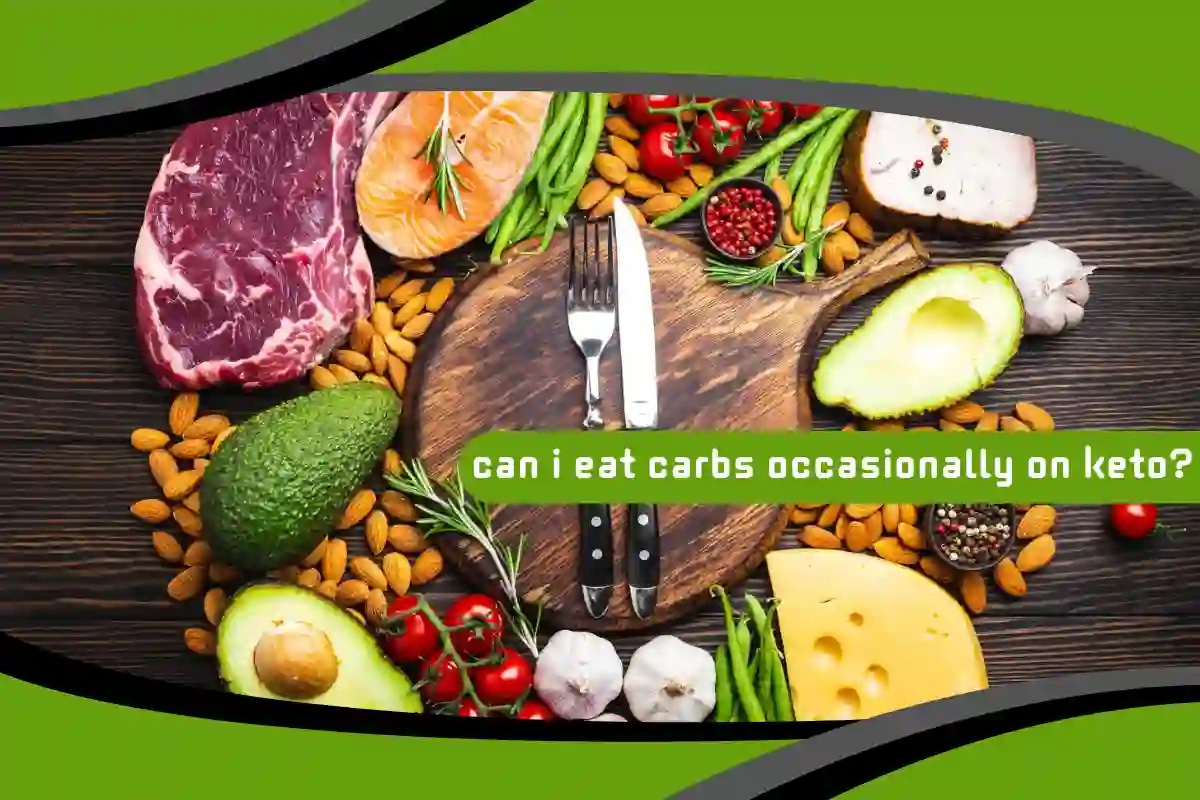The ketogenic diet is known for its strict low-carb, high-fat approach, which fundamentally shifts the body’s metabolism from glucose to ketones for fuel. However, many people following keto wonder whether it’s possible—or even advisable—to occasionally eat carbs without sabotaging their progress. This article delves into this question in detail, offering insights based on nutritional science and metabolic principles. Let’s explore whether carb indulgence fits into the keto lifestyle and how to manage it strategically.

Understanding the Basics of Ketosis
Ketosis is a metabolic state where the body uses fat instead of carbohydrates for energy. Achieving ketosis typically requires limiting carb intake to around 20–50 grams per day, depending on individual factors like activity level and metabolic rate. The state of ketosis is delicate; even small increases in carbohydrate intake can knock the body out of this fat-burning mode. Therefore, understanding how ketosis works is key to knowing how occasional carb intake may affect it.
What Happens When You Eat Carbs on Keto?
When you consume carbohydrates, your body naturally shifts back to using glucose as its primary energy source. This shift can halt ketone production and temporarily push you out of ketosis. The effect depends on how many carbs you consume and how long you’ve been keto-adapted. A single high-carb meal can lead to water retention, insulin spikes, and cravings, potentially making it harder to return to ketosis. However, the disruption is not necessarily permanent if managed properly.
Is It Ever Okay to Have a Carb Day?
In specific situations, having a higher carb day might be acceptable. Athletes, for example, sometimes incorporate “carb refeeding” to replenish glycogen stores for performance. Others may allow occasional carb intake during social events or holidays. The key is intentionality and awareness. If you plan ahead and keep the frequency low, an occasional carb day doesn’t have to derail your progress. But it must be approached with caution and understanding of your body’s response.
Carb Cycling and Ketogenic Diets
Carb cycling involves alternating periods of low-carb and higher-carb intake. Some keto followers use this strategy to support intense workouts or hormonal balance. While it can work for certain individuals, it requires careful planning and monitoring. Carb cycling should not be confused with random carb binges. The goal is to use carbs as a tool, not a cheat. Properly implemented, carb cycling can provide flexibility while preserving many benefits of ketosis.
Strategic Carb Refeeds vs. Cheat Meals
There’s a difference between a structured carb refeed and an impulsive cheat meal. A refeed involves consuming healthy, complex carbohydrates in controlled amounts to support performance or metabolic function. Cheat meals, on the other hand, often involve highly processed, sugar-laden foods that can cause inflammation and cravings. Choosing nutrient-dense carbs like sweet potatoes or quinoa during a refeed can minimize the negative effects while still offering temporary relief from strict ketosis.
How Long Does It Take to Return to Ketosis?
After consuming carbs, it can take anywhere from 24 to 72 hours to return to ketosis, depending on your metabolism, activity level, and the amount of carbs consumed. You can expedite the process by fasting, increasing physical activity, and reducing carb intake immediately after. People who are keto-adapted may return to ketosis faster than beginners. Understanding your body’s rhythm helps you decide whether an occasional deviation is worth the temporary setback.
Watch also: Keto Flu Explained: Causes, Symptoms, and Fast Relief Strategies from a Nutrition Expert
Will One Carb Meal Ruin My Progress?
One high-carb meal will not erase weeks or months of progress, but it can temporarily halt fat loss and disrupt metabolic efficiency. The psychological impact—like increased cravings or feelings of guilt—can sometimes be more damaging than the meal itself. If handled responsibly and infrequently, a single carb-rich meal is unlikely to ruin your keto journey. The key is to treat it as a brief detour, not a permanent derailment.
Listening to Your Body’s Signals
Every individual reacts differently to carbs. Some people can re-enter ketosis quickly after a carb meal, while others struggle with hunger and low energy. Pay close attention to how your body feels, especially after reintroducing carbs. Symptoms like bloating, fatigue, or sugar cravings may indicate that the food choice wasn’t ideal. Use this feedback to make more informed decisions about whether and how often to include carbs.
Psychological and Emotional Considerations
Strict dieting can sometimes lead to feelings of deprivation and food obsession. For some, allowing occasional carb intake may support better long-term adherence and mental balance. The key is mindfulness. Using carbs as a conscious choice rather than emotional coping can help maintain a healthy relationship with food. Understanding the emotional side of eating is just as important as the metabolic mechanics when deciding if occasional carbs fit your lifestyle.
Effects on Weight and Water Retention
Carbs are stored in the body as glycogen, which binds with water. After a carb-heavy meal, you may notice temporary weight gain due to increased water retention—not fat. This can be discouraging if you’re closely tracking your weight, but it’s a normal physiological response. The weight usually normalizes within a few days after returning to ketosis. Awareness of this temporary shift can prevent unnecessary stress or panic.
Can Occasional Carbs Improve Athletic Performance?
Athletes and highly active individuals may find that occasional carb intake enhances their performance and recovery. During high-intensity activities, the body relies more on glycogen than fat for quick energy. Strategic carb intake before or after intense workouts can improve stamina and muscle function. However, for those with sedentary lifestyles, these benefits may not outweigh the risk of being knocked out of ketosis.
Using Whole-Food Carbs Instead of Processed Ones
If you choose to eat carbs occasionally, the quality of those carbs matters significantly. Whole-food sources like vegetables, legumes, berries, and ancient grains offer fiber, antioxidants, and micronutrients that processed foods lack. Choosing clean, nutrient-rich carbs helps minimize blood sugar spikes and supports overall health. Avoiding refined sugars and white flour will make your carb days much less disruptive.
How to Prepare for a Carb Meal
Before consuming a high-carb meal, it’s wise to prepare your body. Engage in a workout beforehand to deplete glycogen stores, which can make your body more efficient at utilizing the incoming carbs. Stay hydrated and include healthy fats and proteins in the meal to slow down glucose absorption. Planning your carb meal instead of indulging impulsively can help you enjoy it without regret.
Watch also: Mastering Keto Meal Prep: Your Complete Weekly Guide to Stress-Free Low-Carb Living
Returning to Keto After Eating Carbs
After a carb meal, focus on getting back into ketosis quickly. A short fast (12–18 hours), high-intensity exercise, and very low-carb meals with healthy fats can accelerate your return to ketosis. Staying committed to your keto principles the following days ensures that a brief indulgence doesn’t turn into a prolonged detour. It’s not about being perfect—it’s about consistency over time.
Frequency Matters More Than Perfection
Having carbs once a month is very different from indulging every weekend. The frequency of carb intake has a significant impact on your ability to stay in ketosis. If you find yourself craving carbs regularly, it might be a sign to reassess your keto approach or your nutrient intake. Occasional doesn’t mean frequent, and being honest about your habits can protect your long-term success.
Does Occasional Carb Intake Affect Ketone Levels?
Yes, even a small amount of carbs can drop your ketone levels temporarily. However, the depth and duration of this dip vary between individuals. Those who’ve been in ketosis for a long time often regain ketone production more quickly than beginners. Testing your ketone levels after carb intake can provide valuable feedback on how your body responds and how long recovery takes.
Managing Social Situations and Special Occasions
Birthday parties, holidays, and cultural events often involve high-carb dishes. Learning how to navigate these situations is essential for long-term sustainability. You can plan a carb meal in advance, practice portion control, or bring keto-friendly options to gatherings. Flexibility without guilt allows you to participate fully in life while still honoring your health goals.
Personalization Is Key to Keto Success
There is no one-size-fits-all answer when it comes to carbs on keto. Some people can handle occasional carbs with ease, while others may struggle to regain balance. Personalization—based on your goals, metabolism, activity level, and psychological response—is crucial. What works for one person may not work for another. Learning to tune into your body and adjust accordingly is the hallmark of a successful keto lifestyle.
The Bottom Line: Occasional Carbs with Caution
Yes, you can eat carbs occasionally on keto—but it must be done with caution, awareness, and strategic planning. Treat them as tools, not temptations. With a thoughtful approach, occasional carb intake can support your flexibility and mental balance without sacrificing the core benefits of ketosis. Just remember: consistency, mindfulness, and quality of food choices matter more than rigid perfection.
Watch also: How Long Does It Take to Enter Ketosis? A Complete Guide to Timing, Signs, and Optimization



No comment